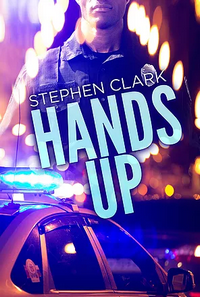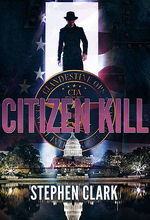 |
Hands UpKindle Edition, 292 pg. Read: November 5, 2019 |

“If you want to survive as a cop on these streets, then you need to check your conscience at the door. Sometimes there’s casualties. But if we don’t do whatever it takes to get the bad guy, then we could end up like your dad”
About a month ago, I posted about N. Lombardi, Jr.’s Justice Gone, and as I started to write this post, I noticed I was about to write something very similar here. But why re-invent the wheel? I’m just going to repeat the first few sentences (don’t worry, I get original after that).
I’ve mentioned before here that after I decide to read a book I forget what its about (if I even know) to keep myself coming from being disappointed by preconceived notions. It worked this time, I really had no idea what it was about when I opened it on my Kindle last week.
Which made the opening pages, featuring the killing of an innocent and unarmed black teen by the police, as shocking as they could’ve been. But they also led me to believe I was in for a grim, adult version of The Hate U Give.
That I’ve used that idea twice in a month says a few things to me, including: 1. Angie Thomas has clearly taken up residence in a corner of my mind (welcome, Angie, sorry for the clutter); 2. the fact that I keep running into novels about the police killing innocents says something about our cultural moment (and it’s not positive); and 3. thankfully, all three of these authors run with the concept in very different directions.
Lombardi quickly becomes about other killings (prompted by the police’s unjust actions and the officers not facing any consequences), Thomas focuses on what happens to the witness of the shooting (but includes what happens to the family of the victim and the city in the aftermath), Clark focuses on the aftermath of the killing on the victim’s family and the officer who pulled the trigger ending Tyrell Wakefield’s life.
Let’s start with that officer, Ryan Quinn, shall we? We meet him in the opening pages, working to reassure himself that he’s not a murderer as he prepares to give a statement about the shooting. He’s been a part of the Philadelphia Police Department for 8 months at this time. His partner, Sgt. Greg Byrnes knew Ryan’s father when he was an officer, too. And after Ryan’s dad was killed on the job, Byrnes has acted as a surrogate father. It’s because of Byrnes that Ryan was in a position where he had to make that fatal choice, and it’s Byrnes that guides him through the aftermath (for good or ill, I’ll let the reader decide).
Clark makes the very uncomfortable choice (for the reader, and I can only imagine for the author) of making Ryan the only first-person narrator of this book. Early on, I resented having to be in his head through all of this—especially as I learned just how sketchy the circumstances around the shooting (and what Byrnes did afterward) were. I didn’t want to be that close to this man’s thoughts at this time, I didn’t want to find him sympathetic, I didn’t want to pull for him at all through this process. Which is exactly the reaction I think that Clark wants. It’s uncomfortable by design.
The shooting affects Ryan, his family and his fiancé. He starts having panic attacks, getting professional help, and taking steps to become a different person on the one hand, while trying to keep his job, avoid prosecution, and rescue his career on the other hand. Too many authors would make him a complete villain or a misunderstood hero. Clark does neither. Or maybe he does both. Either way, Ryan is depicted in a very believable way.
One complaint with Ryan: throughout the book, Ryan thinks of his mother by her first name. I found that distracting at best. I can’t help but wonder if Clark changed him from third-person to first late in the process and forgot to change that to “Mom” (or an equivalent) in the editing process.
As far as Byrnes? Ugh. Clark clearly wants the reader to not trust him, not like him, and wish that Ryan would get away from his influence. He succeeded in all of that with me. He’s not a cartoonish racist cop or anything, he’s just a horrible person.
Now, on to Tyrell’s family. We first meet his sister Jade minutes before she discovers what had happened to him. She then has to break the news to her mother. Their grief and anger feels real, it feels raw, and you can’t help but share their desire for justice and their pain.
Jade’s our second protagonist and from the moment we meet her up until the very end of the book, she’s the one you really identify with, pull for, and agree with almost every step of the way. If Clark had put her in another novel, I’d really enjoy spending time with her as a character instead of watching her in the tumultuous days of anger and grief.
She’s a bartender, and one day Ryan comes into her bar for a few drinks. She recognizes him, he has no idea about Tyrell’s family. Things get interesting from there.
The third protagonist in the book is Tyrell’s estranged father who comes back to Philadelphia after a decade or so away when he gets the news.
Kelly saw his son for the first time in ten years, lying still in a casket, he could feel his heart breaking. He knew he could never get back all the time he lost with him. But if only he could have five minutes. Five minutes to catch up on his life. Five minutes to pass on his wisdom. Five minutes to tell him how much he loved him. Kelly just sat in the pew, staring at his son’s body in silence.
Now, Kelly’s a major complication that this family didn’t need at this time. Initially, I was very sympathetic toward him and wasn’t sure that Jade (and the others, but primarily Jade) were giving him a fair shake. Jade’s openly hostile toward her father—even when others warm to him. It didn’t take me long, though, to get on Jade’s side and start to wonder about Kelly (and Clark did a nice, subtle job with his character).
Each protagonist’s storyline takes on turns that you might not expect going into the book—Kelly and Ryan do a lot in a short amount of time and their characters change and develop. Everything that happens—even though much of it has nothing directly to do with the shooting happens in the shadow of Tyrell’s killing. It colors every conversation, every event, every reaction. In time Jade, Ryan, Kelly and the others will be able to move past this and do other things with their lives. But none of that happens now.
There’s some stuff with Kelly and Jade at the end that made me think about rating this lower, but in the end, Clark pulled it off (and more than once I wondered if he could). Kelly makes some choices that I initially thought unnecessarily complicated a pretty full plot, and I’m still not sure that Jade would have done what she did (and I’m less sure I should accept her explanation of it). But the more space I give those events, and the more I mull about Clark’s resolution, the better I feel about them. But I’m primarily giving this rating for what happens in the first 80 or so percent of the book.
Also, some of my reactions (still) to what happened in this book are so visceral that I’ve got to give Clark the credit for that. This is a much more even work than his first novel (which I liked, but had reservations about), but shares his talent for taking people who should be antagonistic toward each other, untrusting, and disinclined to to build any sort of relationship with each other—and helping them see the common humanity in each other and moving on past their differences. I’m a sucker for that kind of thing, as long as it’s not done in a cheesy, “A Very Special Episode of…” kind of way. Which, I want to stress is why I like Clark’s approach.
It’s not a perfect book, but it’s a good one—with some powerful moments that are dealt with skillfully. I encourage you to check out Clark’s work and join me in waiting to see what he’ll do next.

![]()






